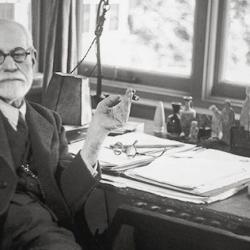Laura Pelaschiar’s forthcoming Joyce/Shakespeare collects essays that explore the various facts of Joyce’s use, misuse, criticism, and combat with Shakespeare. She observes that “Shakespeare’s existence in Joyce is tentacular and functions on many different levels: cultural, structural, political, thematic, contrapuntal, imitational, quotational/misquotational, stylistic, lexical, psychological, or psycholiterary.”
Joyce’s reception of Shakespeare combined long-standing criticism with growing reliance: “Joyce needed Shakespeare more and more for and within his creative process. This is why Ulysses and Finnegans Wake are more Shakespearean than his earlier texts.” It started early, but it’s more than “juvenile competitive literary,” not least because it lasted to the end of Joyce’s writing life.
Harold Bloom’s theory of the “anxiety of influence” comes readily to hand. According to Bloom, later and younger writers are locked in Freudian rivalry with their predecessors, seeking at once to imitate and to bury their literary fathers. According to Pelaschiar, “Bloom’s vision is too limited. In his view, Joyce’s struggle with Shakespeare happens mainly at a linguistic level: in the Wake Joyce finally manages to give full form to his envy by breaking away from ‘the English of Shakespeare,’ and his desire ‘to play at replacing English with the dialect of the Wake, the language of the outlaw’ becomes detectable.” She argues, on the contrary, that “Shakespeare’s presence in Joyce amounts to so much more than a competition for the possession/ dominance/ invention of an ‘English’ artistic language.”
Shakespeare’s effect and Joyce’s ambition were larger. The Bard shaped not only the language of England, but its consciousness, and Joyce set that as the field on which he attempted to mimic and surpass him.















